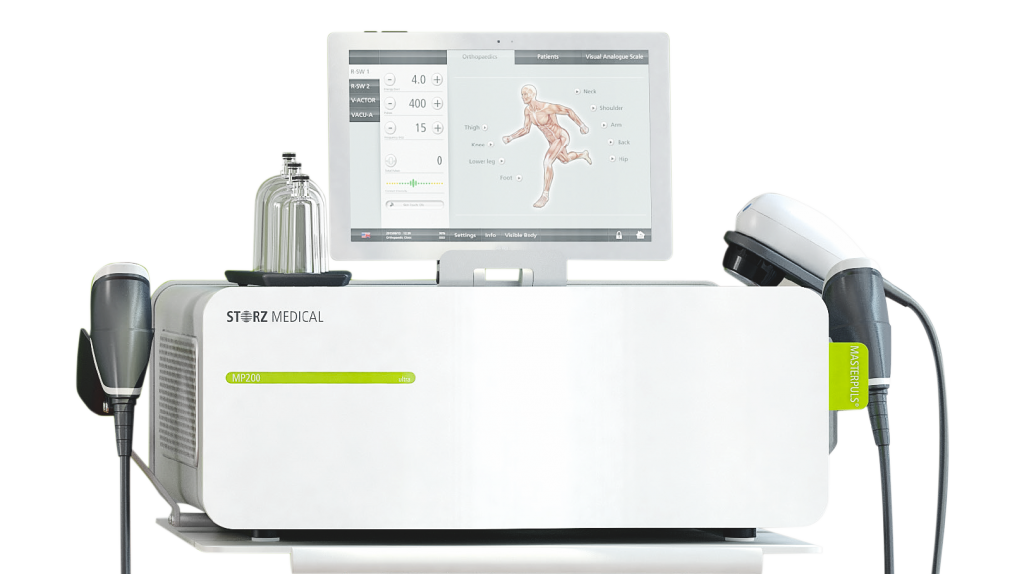Radial Shockwave Therapy (RSWT) has emerged as a revolutionary treatment option for a variety of musculoskeletal conditions. Utilizing high-energy acoustic waves, this non-invasive therapy has gained popularity due to its effectiveness, safety, and ability to treat chronic conditions that have been resistant to other forms of treatment. In this blog post, we will delve into the benefits and efficacy of RSWT, supported by scientific evidence and clinical studies, as well as common reasons to seek this form of therapy.
What is Radial Shockwave Therapy?
RSWT involves the application of high-energy acoustic waves to the affected area, promoting healing and reducing pain. It is commonly used to treat conditions such as:
– Plantar fasciitis
– Achilles tendinopathy
– Tennis elbow
– Shoulder tendinitis
– Calcific shoulder tendinitis
– Patellar tendinopathy
– Hip pain (trochanteric bursitis)
– Shin splints (medial tibial stress syndrome)
Unlike surgical interventions or steroid injections, RSWT offers a non-invasive and drug-free alternative for patients seeking relief from chronic pain and musculoskeletal disorders.
Common Reasons to Seek Radial Shockwave Therapy
Chronic Pain
One of the most common reasons patients seek RSWT is chronic pain that has not responded to conventional treatments such as rest, physical therapy, or anti-inflammatory medications. RSWT can provide significant pain relief by stimulating the body’s natural healing process and reducing inflammation.
Failed Conservative Treatments
Patients who have tried other conservative treatments without success may turn to RSWT as a last resort. Studies have shown that RSWT can be effective for patients who have failed to respond to other forms of treatment, making it a valuable option for those with persistent musculoskeletal conditions.
Sports Injuries
Athletes and active individuals often experience overuse injuries or sports-related conditions that can benefit from RSWT. Conditions such as Achilles tendinopathy, tennis elbow, and patellar tendinopathy are commonly treated with RSWT to promote healing and reduce pain, allowing athletes to return to their sport more quickly.
Calcific Deposits
RSWT has also been shown to be effective in treating calcific shoulder tendinitis, a condition characterized by the buildup of calcium deposits in the shoulder tendons. The acoustic waves generated during RSWT can break down these calcifications, promoting healing and reducing pain.
Benefits of Radial Shockwave Therapy
Non-invasive Treatment
One of the major benefits of RSWT is that it is a non-invasive treatment option. This means that patients can avoid the risks and complications associated with surgery, such as infection, scarring, and prolonged recovery periods. Additionally, RSWT does not require the use of drugs or medications, reducing the risk of side effects and drug interactions.
Effective Pain Relief
Numerous studies have demonstrated the efficacy of RSWT in reducing pain and improving function in patients with chronic musculoskeletal conditions. A meta-analysis published in the Journal of Orthopaedic Surgery and Research found that RSWT was effective in reducing pain and improving function in patients with plantar fasciitis and other chronic tendinopathies[^1^].
Accelerated Healing
RSWT promotes the body’s natural healing process by increasing blood flow to the affected area, stimulating the production of collagen, and reducing inflammation. This leads to accelerated healing of damaged tissues and improved overall function. A study published in the American Journal of Sports Medicine found that RSWT was effective in promoting healing and reducing pain in patients with chronic Achilles tendinopathy[^2^].
Conclusion
Radial Shockwave Therapy offers a non-invasive, effective, and safe treatment option for patients suffering from a variety of musculoskeletal conditions. Its ability to reduce pain, improve function, and accelerate healing makes it a valuable tool in the management of chronic pain and musculoskeletal disorders. As with any medical treatment, it is important for patients to consult with a healthcare professional to determine if RSWT is the right treatment option for their individual needs.
References
[^1^]: Rompe JD, Furia J, Maffulli N. Eccentric loading compared with shock wave treatment for chronic insertional Achilles tendinopathy. A randomized, controlled trial. J Bone Joint Surg Am. 2008;90(1):52-61.
[^2^]: Rompe JD, Furia J, Maffulli N. Mid-portion Achilles tendinopathy–current options for treatment. Disabil Rehabil. 2008;30(20-22):1666-76.
Please note that while RSWT has shown promising results in treating various musculoskeletal conditions, individual responses to treatment may vary. It is always recommended to consult with a healthcare professional before undergoing any new treatment or therapy.

